Hospitality Operations Management Report: Customer Focus
VerifiedAdded on 2021/01/02
|14
|3985
|264
Report
AI Summary
This report delves into the intricacies of hospitality operations management, using Marriott Hotel as a primary case study. It begins by exploring the nature of hospitality products and services, including tangible, intangible, and perishable aspects, alongside the influences affecting demand patterns such as seasonality, time of day, lifestyle, and economic factors. The report then compares customer profiles, expectations, and requirements based on income and meal preferences. Key stages in product and service development are examined, including idea generation, screening, concept development, product development, test marketing, commercialization, and launch, illustrating how Marriott can utilize these steps. The report further analyzes features contributing to customer perception, such as standardization, service style, brand image, and pricing, while also evaluating merchandising opportunities to enhance customer engagement and sales. Finally, it addresses pricing methods, factors affecting revenue and profitability, and the application of performance measures and appraisal techniques within the hospitality industry. The report concludes with an evaluation of business analysis, evaluation, and planning approaches appropriate for hospitality operations.
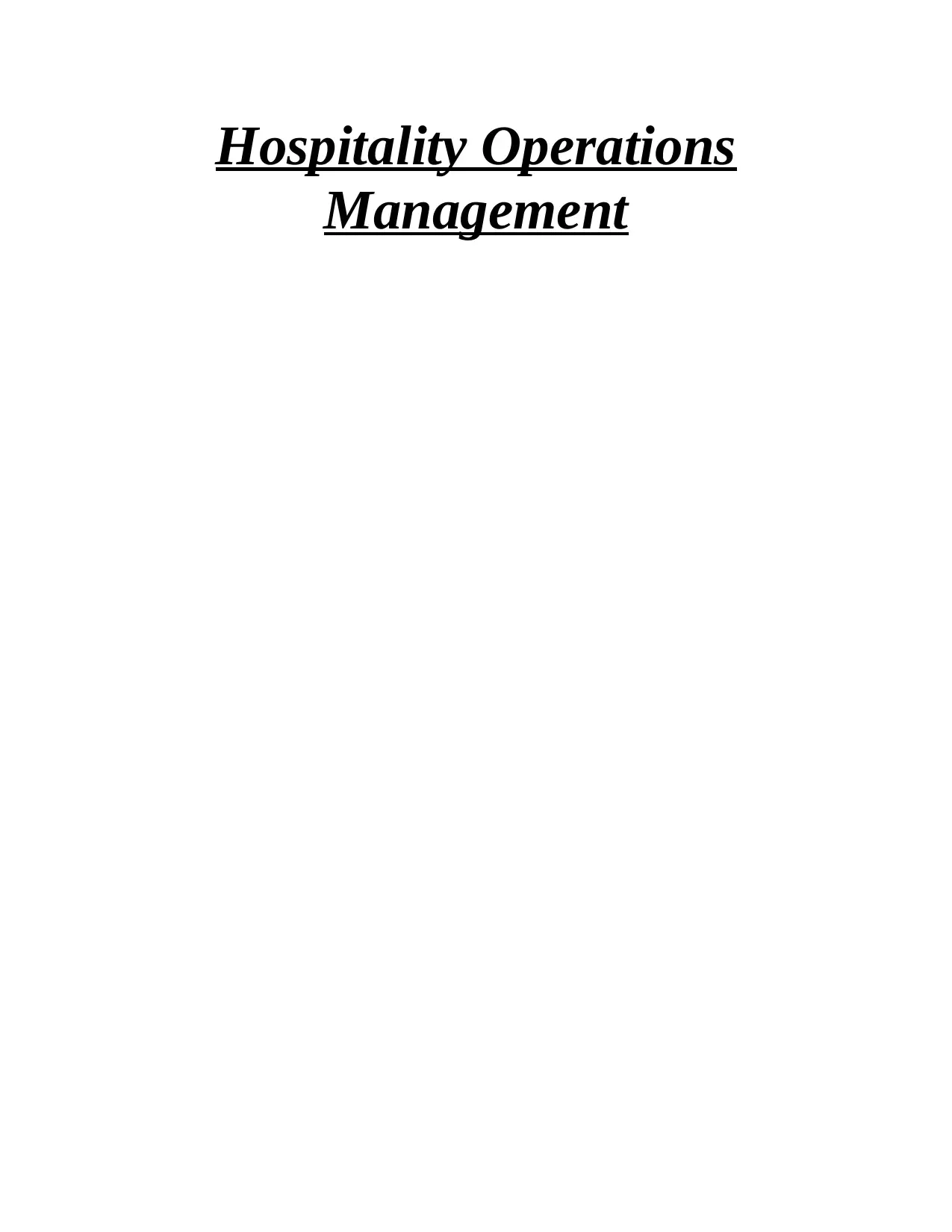
Hospitality Operations
Management
Management
Paraphrase This Document
Need a fresh take? Get an instant paraphrase of this document with our AI Paraphraser
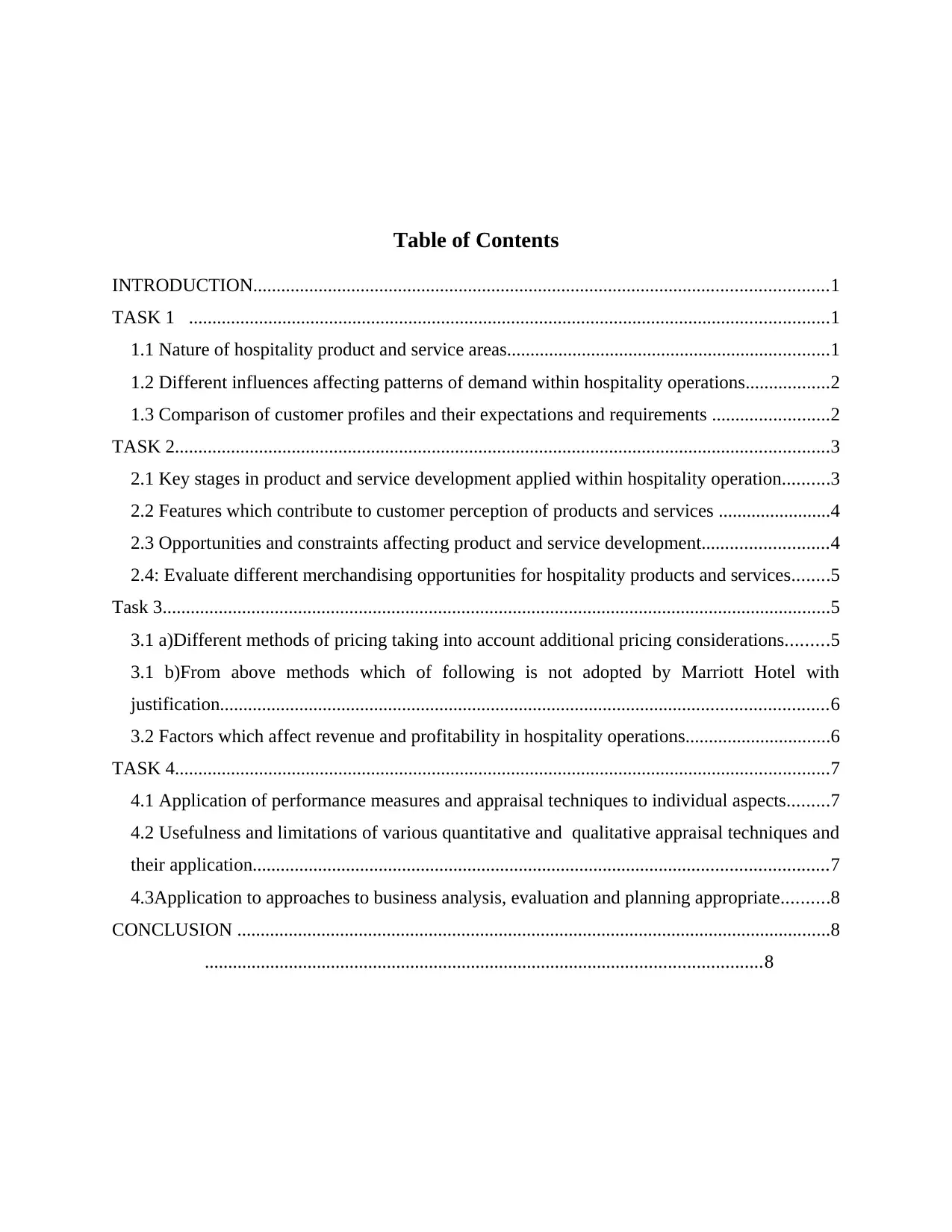
Table of Contents
INTRODUCTION...........................................................................................................................1
TASK 1 .........................................................................................................................................1
1.1 Nature of hospitality product and service areas.....................................................................1
1.2 Different influences affecting patterns of demand within hospitality operations..................2
1.3 Comparison of customer profiles and their expectations and requirements .........................2
TASK 2............................................................................................................................................3
2.1 Key stages in product and service development applied within hospitality operation..........3
2.2 Features which contribute to customer perception of products and services ........................4
2.3 Opportunities and constraints affecting product and service development...........................4
2.4: Evaluate different merchandising opportunities for hospitality products and services........5
Task 3...............................................................................................................................................5
3.1 a)Different methods of pricing taking into account additional pricing considerations.........5
3.1 b)From above methods which of following is not adopted by Marriott Hotel with
justification..................................................................................................................................6
3.2 Factors which affect revenue and profitability in hospitality operations...............................6
TASK 4............................................................................................................................................7
4.1 Application of performance measures and appraisal techniques to individual aspects.........7
4.2 Usefulness and limitations of various quantitative and qualitative appraisal techniques and
their application...........................................................................................................................7
4.3Application to approaches to business analysis, evaluation and planning appropriate..........8
CONCLUSION ...............................................................................................................................8
.......................................................................................................................8
INTRODUCTION...........................................................................................................................1
TASK 1 .........................................................................................................................................1
1.1 Nature of hospitality product and service areas.....................................................................1
1.2 Different influences affecting patterns of demand within hospitality operations..................2
1.3 Comparison of customer profiles and their expectations and requirements .........................2
TASK 2............................................................................................................................................3
2.1 Key stages in product and service development applied within hospitality operation..........3
2.2 Features which contribute to customer perception of products and services ........................4
2.3 Opportunities and constraints affecting product and service development...........................4
2.4: Evaluate different merchandising opportunities for hospitality products and services........5
Task 3...............................................................................................................................................5
3.1 a)Different methods of pricing taking into account additional pricing considerations.........5
3.1 b)From above methods which of following is not adopted by Marriott Hotel with
justification..................................................................................................................................6
3.2 Factors which affect revenue and profitability in hospitality operations...............................6
TASK 4............................................................................................................................................7
4.1 Application of performance measures and appraisal techniques to individual aspects.........7
4.2 Usefulness and limitations of various quantitative and qualitative appraisal techniques and
their application...........................................................................................................................7
4.3Application to approaches to business analysis, evaluation and planning appropriate..........8
CONCLUSION ...............................................................................................................................8
.......................................................................................................................8

⊘ This is a preview!⊘
Do you want full access?
Subscribe today to unlock all pages.

Trusted by 1+ million students worldwide
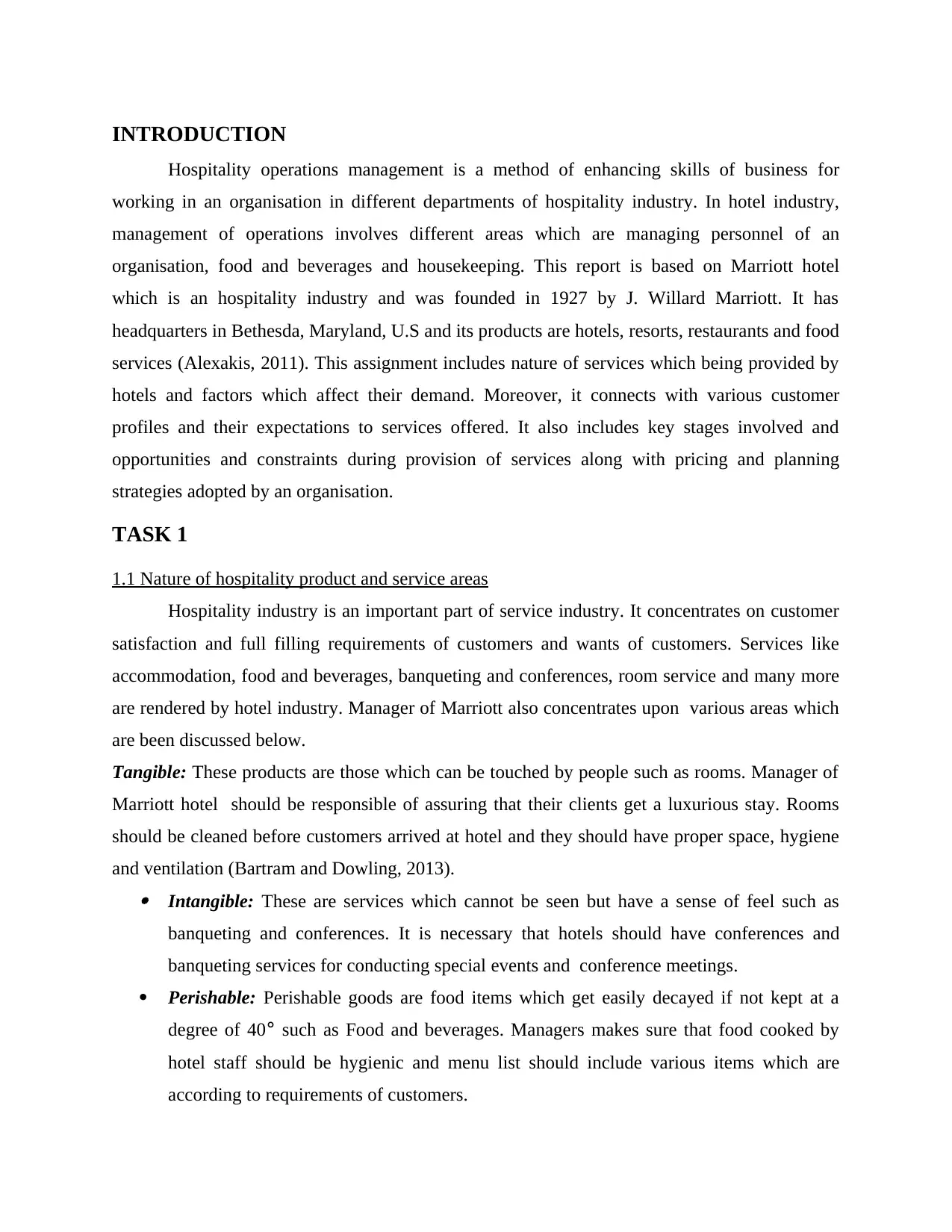
INTRODUCTION
Hospitality operations management is a method of enhancing skills of business for
working in an organisation in different departments of hospitality industry. In hotel industry,
management of operations involves different areas which are managing personnel of an
organisation, food and beverages and housekeeping. This report is based on Marriott hotel
which is an hospitality industry and was founded in 1927 by J. Willard Marriott. It has
headquarters in Bethesda, Maryland, U.S and its products are hotels, resorts, restaurants and food
services (Alexakis, 2011). This assignment includes nature of services which being provided by
hotels and factors which affect their demand. Moreover, it connects with various customer
profiles and their expectations to services offered. It also includes key stages involved and
opportunities and constraints during provision of services along with pricing and planning
strategies adopted by an organisation.
TASK 1
1.1 Nature of hospitality product and service areas
Hospitality industry is an important part of service industry. It concentrates on customer
satisfaction and full filling requirements of customers and wants of customers. Services like
accommodation, food and beverages, banqueting and conferences, room service and many more
are rendered by hotel industry. Manager of Marriott also concentrates upon various areas which
are been discussed below.
Tangible: These products are those which can be touched by people such as rooms. Manager of
Marriott hotel should be responsible of assuring that their clients get a luxurious stay. Rooms
should be cleaned before customers arrived at hotel and they should have proper space, hygiene
and ventilation (Bartram and Dowling, 2013). Intangible: These are services which cannot be seen but have a sense of feel such as
banqueting and conferences. It is necessary that hotels should have conferences and
banqueting services for conducting special events and conference meetings.
Perishable: Perishable goods are food items which get easily decayed if not kept at a
degree of 40° such as Food and beverages. Managers makes sure that food cooked by
hotel staff should be hygienic and menu list should include various items which are
according to requirements of customers.
Hospitality operations management is a method of enhancing skills of business for
working in an organisation in different departments of hospitality industry. In hotel industry,
management of operations involves different areas which are managing personnel of an
organisation, food and beverages and housekeeping. This report is based on Marriott hotel
which is an hospitality industry and was founded in 1927 by J. Willard Marriott. It has
headquarters in Bethesda, Maryland, U.S and its products are hotels, resorts, restaurants and food
services (Alexakis, 2011). This assignment includes nature of services which being provided by
hotels and factors which affect their demand. Moreover, it connects with various customer
profiles and their expectations to services offered. It also includes key stages involved and
opportunities and constraints during provision of services along with pricing and planning
strategies adopted by an organisation.
TASK 1
1.1 Nature of hospitality product and service areas
Hospitality industry is an important part of service industry. It concentrates on customer
satisfaction and full filling requirements of customers and wants of customers. Services like
accommodation, food and beverages, banqueting and conferences, room service and many more
are rendered by hotel industry. Manager of Marriott also concentrates upon various areas which
are been discussed below.
Tangible: These products are those which can be touched by people such as rooms. Manager of
Marriott hotel should be responsible of assuring that their clients get a luxurious stay. Rooms
should be cleaned before customers arrived at hotel and they should have proper space, hygiene
and ventilation (Bartram and Dowling, 2013). Intangible: These are services which cannot be seen but have a sense of feel such as
banqueting and conferences. It is necessary that hotels should have conferences and
banqueting services for conducting special events and conference meetings.
Perishable: Perishable goods are food items which get easily decayed if not kept at a
degree of 40° such as Food and beverages. Managers makes sure that food cooked by
hotel staff should be hygienic and menu list should include various items which are
according to requirements of customers.
Paraphrase This Document
Need a fresh take? Get an instant paraphrase of this document with our AI Paraphraser
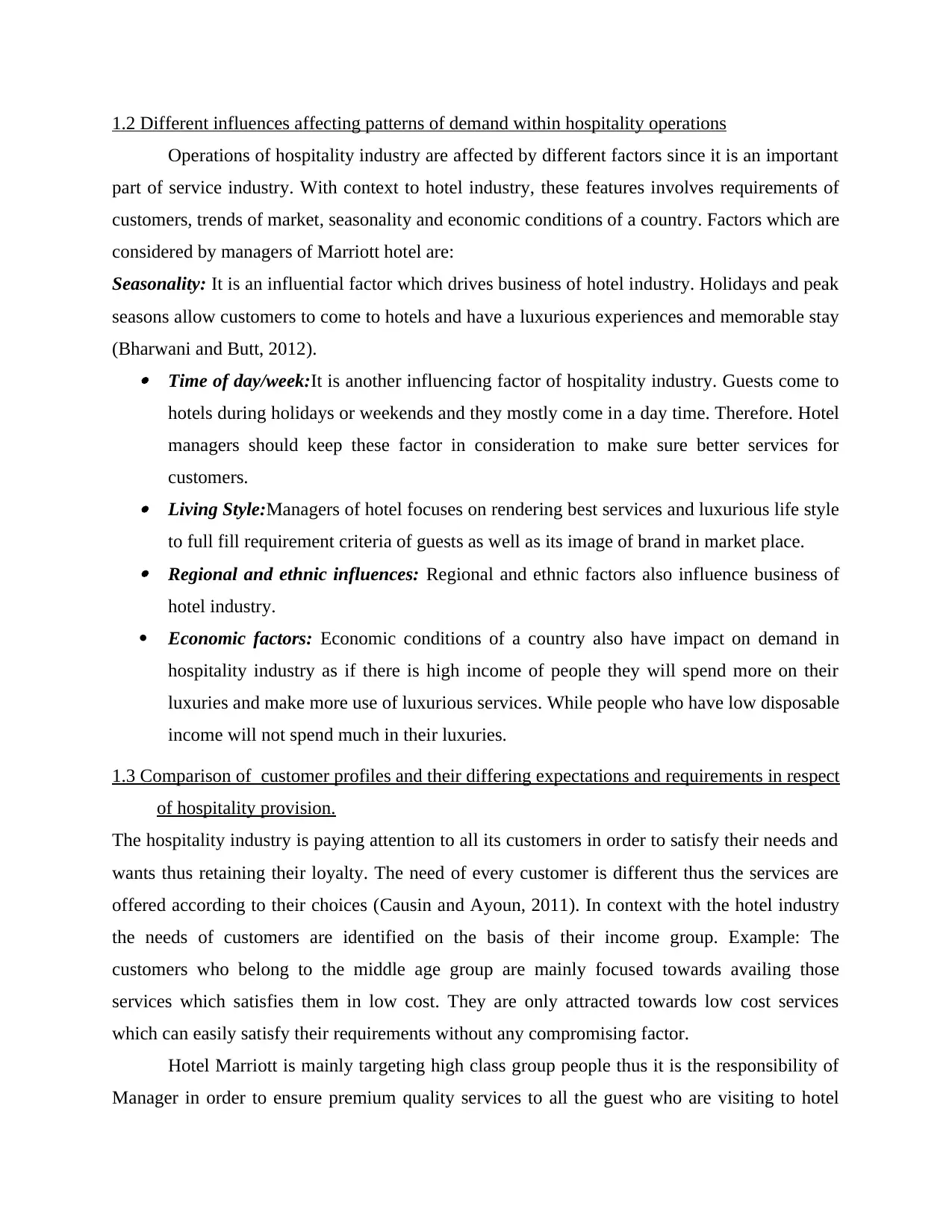
1.2 Different influences affecting patterns of demand within hospitality operations
Operations of hospitality industry are affected by different factors since it is an important
part of service industry. With context to hotel industry, these features involves requirements of
customers, trends of market, seasonality and economic conditions of a country. Factors which are
considered by managers of Marriott hotel are:
Seasonality: It is an influential factor which drives business of hotel industry. Holidays and peak
seasons allow customers to come to hotels and have a luxurious experiences and memorable stay
(Bharwani and Butt, 2012). Time of day/week:It is another influencing factor of hospitality industry. Guests come to
hotels during holidays or weekends and they mostly come in a day time. Therefore. Hotel
managers should keep these factor in consideration to make sure better services for
customers. Living Style:Managers of hotel focuses on rendering best services and luxurious life style
to full fill requirement criteria of guests as well as its image of brand in market place. Regional and ethnic influences: Regional and ethnic factors also influence business of
hotel industry.
Economic factors: Economic conditions of a country also have impact on demand in
hospitality industry as if there is high income of people they will spend more on their
luxuries and make more use of luxurious services. While people who have low disposable
income will not spend much in their luxuries.
1.3 Comparison of customer profiles and their differing expectations and requirements in respect
of hospitality provision.
The hospitality industry is paying attention to all its customers in order to satisfy their needs and
wants thus retaining their loyalty. The need of every customer is different thus the services are
offered according to their choices (Causin and Ayoun, 2011). In context with the hotel industry
the needs of customers are identified on the basis of their income group. Example: The
customers who belong to the middle age group are mainly focused towards availing those
services which satisfies them in low cost. They are only attracted towards low cost services
which can easily satisfy their requirements without any compromising factor.
Hotel Marriott is mainly targeting high class group people thus it is the responsibility of
Manager in order to ensure premium quality services to all the guest who are visiting to hotel
Operations of hospitality industry are affected by different factors since it is an important
part of service industry. With context to hotel industry, these features involves requirements of
customers, trends of market, seasonality and economic conditions of a country. Factors which are
considered by managers of Marriott hotel are:
Seasonality: It is an influential factor which drives business of hotel industry. Holidays and peak
seasons allow customers to come to hotels and have a luxurious experiences and memorable stay
(Bharwani and Butt, 2012). Time of day/week:It is another influencing factor of hospitality industry. Guests come to
hotels during holidays or weekends and they mostly come in a day time. Therefore. Hotel
managers should keep these factor in consideration to make sure better services for
customers. Living Style:Managers of hotel focuses on rendering best services and luxurious life style
to full fill requirement criteria of guests as well as its image of brand in market place. Regional and ethnic influences: Regional and ethnic factors also influence business of
hotel industry.
Economic factors: Economic conditions of a country also have impact on demand in
hospitality industry as if there is high income of people they will spend more on their
luxuries and make more use of luxurious services. While people who have low disposable
income will not spend much in their luxuries.
1.3 Comparison of customer profiles and their differing expectations and requirements in respect
of hospitality provision.
The hospitality industry is paying attention to all its customers in order to satisfy their needs and
wants thus retaining their loyalty. The need of every customer is different thus the services are
offered according to their choices (Causin and Ayoun, 2011). In context with the hotel industry
the needs of customers are identified on the basis of their income group. Example: The
customers who belong to the middle age group are mainly focused towards availing those
services which satisfies them in low cost. They are only attracted towards low cost services
which can easily satisfy their requirements without any compromising factor.
Hotel Marriott is mainly targeting high class group people thus it is the responsibility of
Manager in order to ensure premium quality services to all the guest who are visiting to hotel
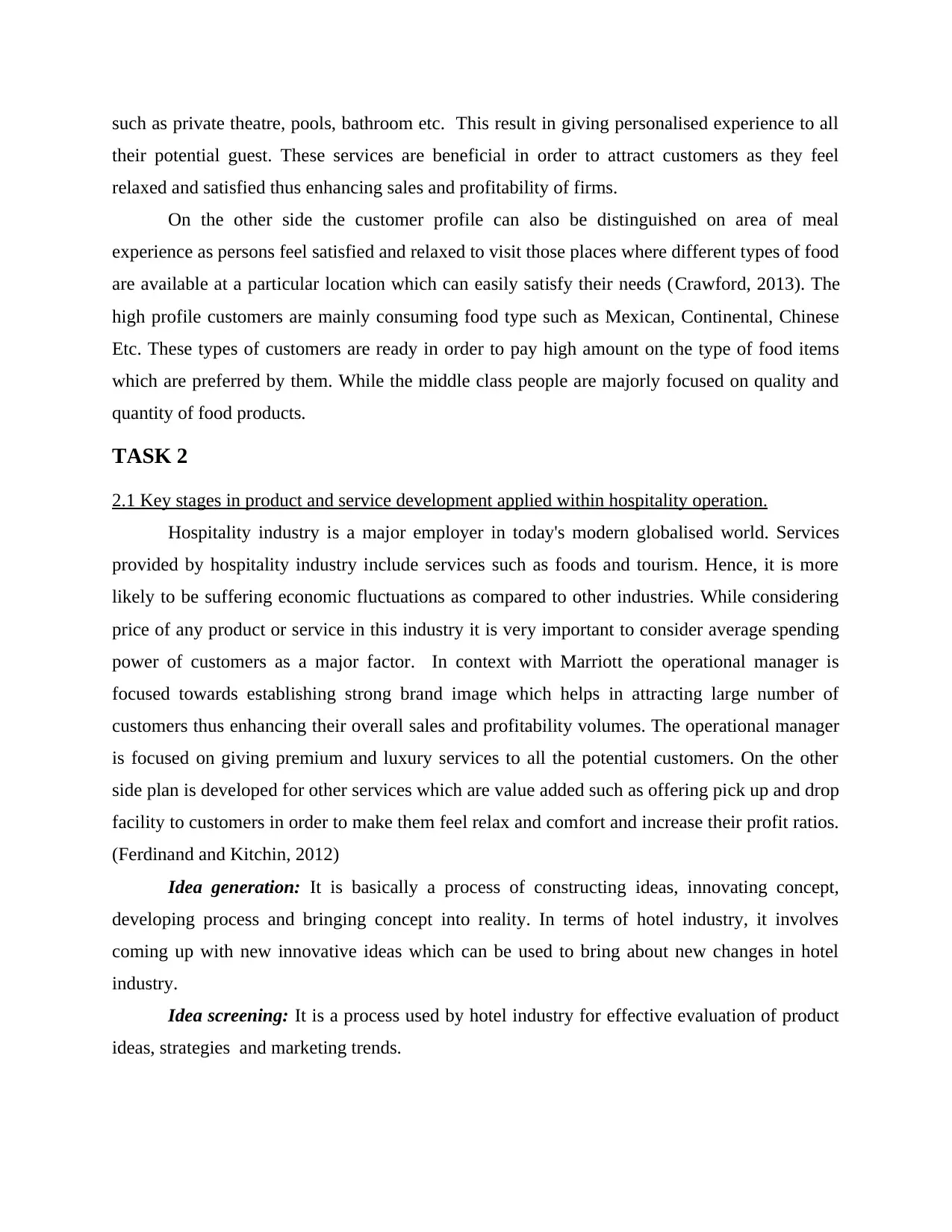
such as private theatre, pools, bathroom etc. This result in giving personalised experience to all
their potential guest. These services are beneficial in order to attract customers as they feel
relaxed and satisfied thus enhancing sales and profitability of firms.
On the other side the customer profile can also be distinguished on area of meal
experience as persons feel satisfied and relaxed to visit those places where different types of food
are available at a particular location which can easily satisfy their needs (Crawford, 2013). The
high profile customers are mainly consuming food type such as Mexican, Continental, Chinese
Etc. These types of customers are ready in order to pay high amount on the type of food items
which are preferred by them. While the middle class people are majorly focused on quality and
quantity of food products.
TASK 2
2.1 Key stages in product and service development applied within hospitality operation.
Hospitality industry is a major employer in today's modern globalised world. Services
provided by hospitality industry include services such as foods and tourism. Hence, it is more
likely to be suffering economic fluctuations as compared to other industries. While considering
price of any product or service in this industry it is very important to consider average spending
power of customers as a major factor. In context with Marriott the operational manager is
focused towards establishing strong brand image which helps in attracting large number of
customers thus enhancing their overall sales and profitability volumes. The operational manager
is focused on giving premium and luxury services to all the potential customers. On the other
side plan is developed for other services which are value added such as offering pick up and drop
facility to customers in order to make them feel relax and comfort and increase their profit ratios.
(Ferdinand and Kitchin, 2012)
Idea generation: It is basically a process of constructing ideas, innovating concept,
developing process and bringing concept into reality. In terms of hotel industry, it involves
coming up with new innovative ideas which can be used to bring about new changes in hotel
industry.
Idea screening: It is a process used by hotel industry for effective evaluation of product
ideas, strategies and marketing trends.
their potential guest. These services are beneficial in order to attract customers as they feel
relaxed and satisfied thus enhancing sales and profitability of firms.
On the other side the customer profile can also be distinguished on area of meal
experience as persons feel satisfied and relaxed to visit those places where different types of food
are available at a particular location which can easily satisfy their needs (Crawford, 2013). The
high profile customers are mainly consuming food type such as Mexican, Continental, Chinese
Etc. These types of customers are ready in order to pay high amount on the type of food items
which are preferred by them. While the middle class people are majorly focused on quality and
quantity of food products.
TASK 2
2.1 Key stages in product and service development applied within hospitality operation.
Hospitality industry is a major employer in today's modern globalised world. Services
provided by hospitality industry include services such as foods and tourism. Hence, it is more
likely to be suffering economic fluctuations as compared to other industries. While considering
price of any product or service in this industry it is very important to consider average spending
power of customers as a major factor. In context with Marriott the operational manager is
focused towards establishing strong brand image which helps in attracting large number of
customers thus enhancing their overall sales and profitability volumes. The operational manager
is focused on giving premium and luxury services to all the potential customers. On the other
side plan is developed for other services which are value added such as offering pick up and drop
facility to customers in order to make them feel relax and comfort and increase their profit ratios.
(Ferdinand and Kitchin, 2012)
Idea generation: It is basically a process of constructing ideas, innovating concept,
developing process and bringing concept into reality. In terms of hotel industry, it involves
coming up with new innovative ideas which can be used to bring about new changes in hotel
industry.
Idea screening: It is a process used by hotel industry for effective evaluation of product
ideas, strategies and marketing trends.
⊘ This is a preview!⊘
Do you want full access?
Subscribe today to unlock all pages.

Trusted by 1+ million students worldwide
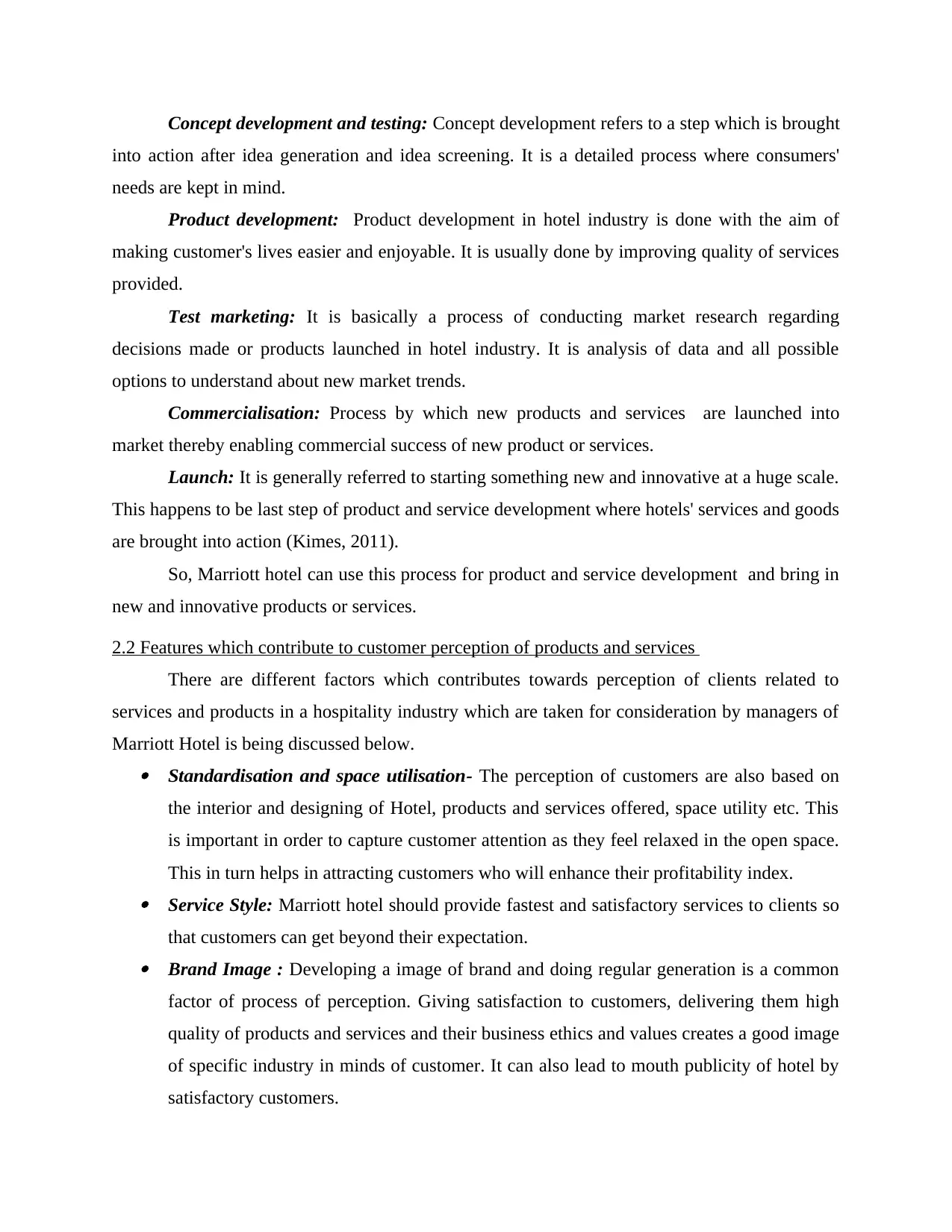
Concept development and testing: Concept development refers to a step which is brought
into action after idea generation and idea screening. It is a detailed process where consumers'
needs are kept in mind.
Product development: Product development in hotel industry is done with the aim of
making customer's lives easier and enjoyable. It is usually done by improving quality of services
provided.
Test marketing: It is basically a process of conducting market research regarding
decisions made or products launched in hotel industry. It is analysis of data and all possible
options to understand about new market trends.
Commercialisation: Process by which new products and services are launched into
market thereby enabling commercial success of new product or services.
Launch: It is generally referred to starting something new and innovative at a huge scale.
This happens to be last step of product and service development where hotels' services and goods
are brought into action (Kimes, 2011).
So, Marriott hotel can use this process for product and service development and bring in
new and innovative products or services.
2.2 Features which contribute to customer perception of products and services
There are different factors which contributes towards perception of clients related to
services and products in a hospitality industry which are taken for consideration by managers of
Marriott Hotel is being discussed below. Standardisation and space utilisation- The perception of customers are also based on
the interior and designing of Hotel, products and services offered, space utility etc. This
is important in order to capture customer attention as they feel relaxed in the open space.
This in turn helps in attracting customers who will enhance their profitability index. Service Style: Marriott hotel should provide fastest and satisfactory services to clients so
that customers can get beyond their expectation. Brand Image : Developing a image of brand and doing regular generation is a common
factor of process of perception. Giving satisfaction to customers, delivering them high
quality of products and services and their business ethics and values creates a good image
of specific industry in minds of customer. It can also lead to mouth publicity of hotel by
satisfactory customers.
into action after idea generation and idea screening. It is a detailed process where consumers'
needs are kept in mind.
Product development: Product development in hotel industry is done with the aim of
making customer's lives easier and enjoyable. It is usually done by improving quality of services
provided.
Test marketing: It is basically a process of conducting market research regarding
decisions made or products launched in hotel industry. It is analysis of data and all possible
options to understand about new market trends.
Commercialisation: Process by which new products and services are launched into
market thereby enabling commercial success of new product or services.
Launch: It is generally referred to starting something new and innovative at a huge scale.
This happens to be last step of product and service development where hotels' services and goods
are brought into action (Kimes, 2011).
So, Marriott hotel can use this process for product and service development and bring in
new and innovative products or services.
2.2 Features which contribute to customer perception of products and services
There are different factors which contributes towards perception of clients related to
services and products in a hospitality industry which are taken for consideration by managers of
Marriott Hotel is being discussed below. Standardisation and space utilisation- The perception of customers are also based on
the interior and designing of Hotel, products and services offered, space utility etc. This
is important in order to capture customer attention as they feel relaxed in the open space.
This in turn helps in attracting customers who will enhance their profitability index. Service Style: Marriott hotel should provide fastest and satisfactory services to clients so
that customers can get beyond their expectation. Brand Image : Developing a image of brand and doing regular generation is a common
factor of process of perception. Giving satisfaction to customers, delivering them high
quality of products and services and their business ethics and values creates a good image
of specific industry in minds of customer. It can also lead to mouth publicity of hotel by
satisfactory customers.
Paraphrase This Document
Need a fresh take? Get an instant paraphrase of this document with our AI Paraphraser
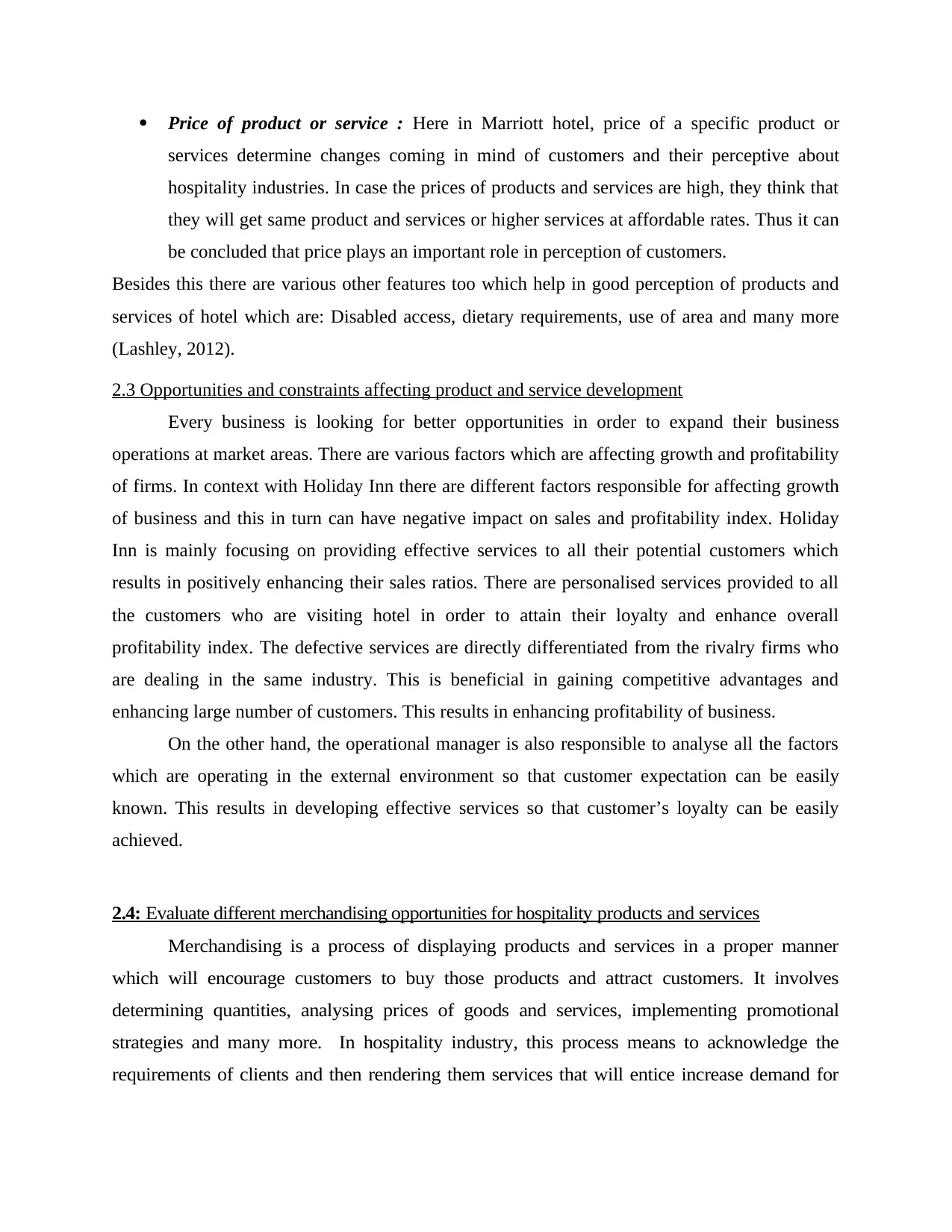
Price of product or service : Here in Marriott hotel, price of a specific product or
services determine changes coming in mind of customers and their perceptive about
hospitality industries. In case the prices of products and services are high, they think that
they will get same product and services or higher services at affordable rates. Thus it can
be concluded that price plays an important role in perception of customers.
Besides this there are various other features too which help in good perception of products and
services of hotel which are: Disabled access, dietary requirements, use of area and many more
(Lashley, 2012).
2.3 Opportunities and constraints affecting product and service development
Every business is looking for better opportunities in order to expand their business
operations at market areas. There are various factors which are affecting growth and profitability
of firms. In context with Holiday Inn there are different factors responsible for affecting growth
of business and this in turn can have negative impact on sales and profitability index. Holiday
Inn is mainly focusing on providing effective services to all their potential customers which
results in positively enhancing their sales ratios. There are personalised services provided to all
the customers who are visiting hotel in order to attain their loyalty and enhance overall
profitability index. The defective services are directly differentiated from the rivalry firms who
are dealing in the same industry. This is beneficial in gaining competitive advantages and
enhancing large number of customers. This results in enhancing profitability of business.
On the other hand, the operational manager is also responsible to analyse all the factors
which are operating in the external environment so that customer expectation can be easily
known. This results in developing effective services so that customer’s loyalty can be easily
achieved.
2.4: Evaluate different merchandising opportunities for hospitality products and services
Merchandising is a process of displaying products and services in a proper manner
which will encourage customers to buy those products and attract customers. It involves
determining quantities, analysing prices of goods and services, implementing promotional
strategies and many more. In hospitality industry, this process means to acknowledge the
requirements of clients and then rendering them services that will entice increase demand for
services determine changes coming in mind of customers and their perceptive about
hospitality industries. In case the prices of products and services are high, they think that
they will get same product and services or higher services at affordable rates. Thus it can
be concluded that price plays an important role in perception of customers.
Besides this there are various other features too which help in good perception of products and
services of hotel which are: Disabled access, dietary requirements, use of area and many more
(Lashley, 2012).
2.3 Opportunities and constraints affecting product and service development
Every business is looking for better opportunities in order to expand their business
operations at market areas. There are various factors which are affecting growth and profitability
of firms. In context with Holiday Inn there are different factors responsible for affecting growth
of business and this in turn can have negative impact on sales and profitability index. Holiday
Inn is mainly focusing on providing effective services to all their potential customers which
results in positively enhancing their sales ratios. There are personalised services provided to all
the customers who are visiting hotel in order to attain their loyalty and enhance overall
profitability index. The defective services are directly differentiated from the rivalry firms who
are dealing in the same industry. This is beneficial in gaining competitive advantages and
enhancing large number of customers. This results in enhancing profitability of business.
On the other hand, the operational manager is also responsible to analyse all the factors
which are operating in the external environment so that customer expectation can be easily
known. This results in developing effective services so that customer’s loyalty can be easily
achieved.
2.4: Evaluate different merchandising opportunities for hospitality products and services
Merchandising is a process of displaying products and services in a proper manner
which will encourage customers to buy those products and attract customers. It involves
determining quantities, analysing prices of goods and services, implementing promotional
strategies and many more. In hospitality industry, this process means to acknowledge the
requirements of clients and then rendering them services that will entice increase demand for
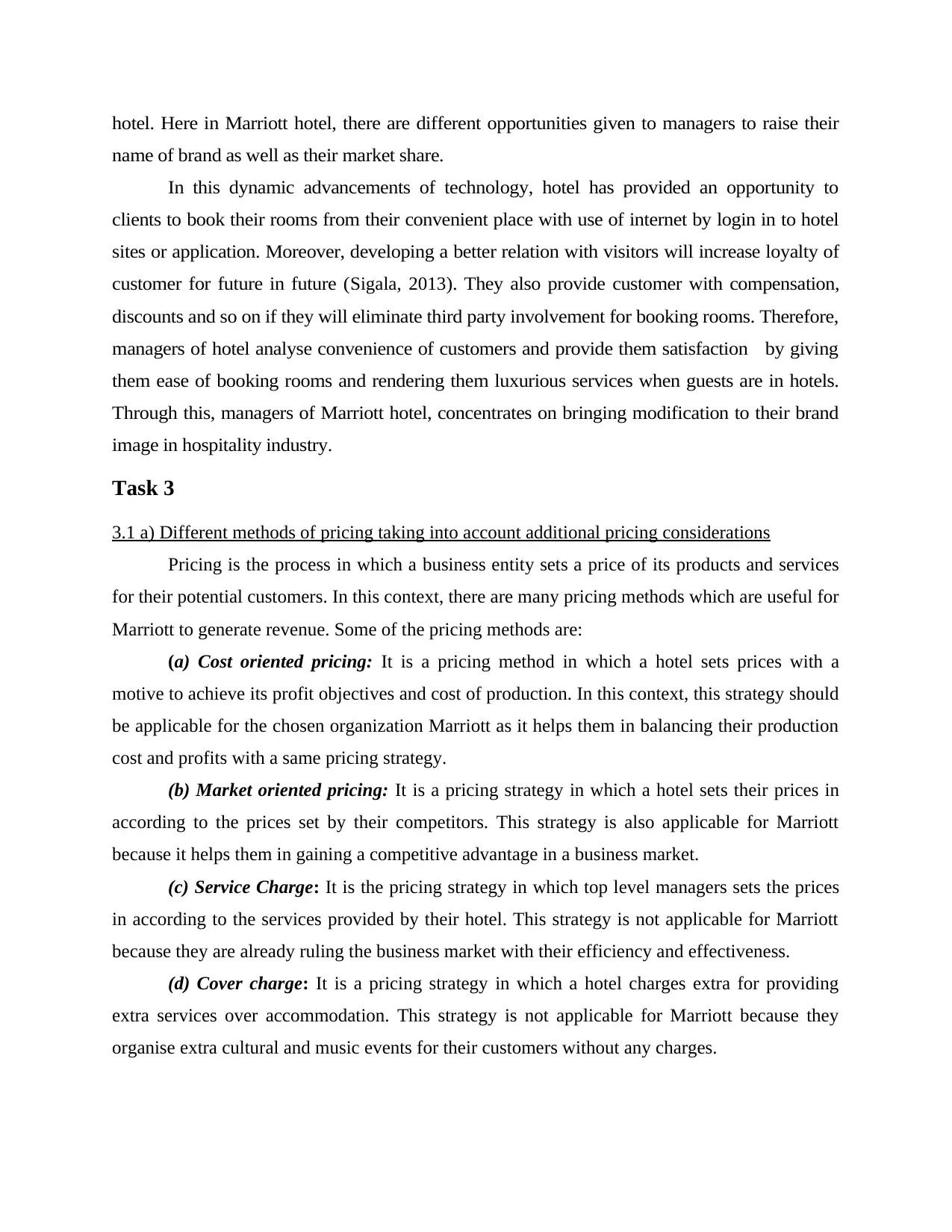
hotel. Here in Marriott hotel, there are different opportunities given to managers to raise their
name of brand as well as their market share.
In this dynamic advancements of technology, hotel has provided an opportunity to
clients to book their rooms from their convenient place with use of internet by login in to hotel
sites or application. Moreover, developing a better relation with visitors will increase loyalty of
customer for future in future (Sigala, 2013 ). They also provide customer with compensation,
discounts and so on if they will eliminate third party involvement for booking rooms. Therefore,
managers of hotel analyse convenience of customers and provide them satisfaction by giving
them ease of booking rooms and rendering them luxurious services when guests are in hotels.
Through this, managers of Marriott hotel, concentrates on bringing modification to their brand
image in hospitality industry.
Task 3
3.1 a) Different methods of pricing taking into account additional pricing considerations
Pricing is the process in which a business entity sets a price of its products and services
for their potential customers. In this context, there are many pricing methods which are useful for
Marriott to generate revenue. Some of the pricing methods are:
(a) Cost oriented pricing: It is a pricing method in which a hotel sets prices with a
motive to achieve its profit objectives and cost of production. In this context, this strategy should
be applicable for the chosen organization Marriott as it helps them in balancing their production
cost and profits with a same pricing strategy.
(b) Market oriented pricing: It is a pricing strategy in which a hotel sets their prices in
according to the prices set by their competitors. This strategy is also applicable for Marriott
because it helps them in gaining a competitive advantage in a business market.
(c) Service Charge: It is the pricing strategy in which top level managers sets the prices
in according to the services provided by their hotel. This strategy is not applicable for Marriott
because they are already ruling the business market with their efficiency and effectiveness.
(d) Cover charge: It is a pricing strategy in which a hotel charges extra for providing
extra services over accommodation. This strategy is not applicable for Marriott because they
organise extra cultural and music events for their customers without any charges.
name of brand as well as their market share.
In this dynamic advancements of technology, hotel has provided an opportunity to
clients to book their rooms from their convenient place with use of internet by login in to hotel
sites or application. Moreover, developing a better relation with visitors will increase loyalty of
customer for future in future (Sigala, 2013 ). They also provide customer with compensation,
discounts and so on if they will eliminate third party involvement for booking rooms. Therefore,
managers of hotel analyse convenience of customers and provide them satisfaction by giving
them ease of booking rooms and rendering them luxurious services when guests are in hotels.
Through this, managers of Marriott hotel, concentrates on bringing modification to their brand
image in hospitality industry.
Task 3
3.1 a) Different methods of pricing taking into account additional pricing considerations
Pricing is the process in which a business entity sets a price of its products and services
for their potential customers. In this context, there are many pricing methods which are useful for
Marriott to generate revenue. Some of the pricing methods are:
(a) Cost oriented pricing: It is a pricing method in which a hotel sets prices with a
motive to achieve its profit objectives and cost of production. In this context, this strategy should
be applicable for the chosen organization Marriott as it helps them in balancing their production
cost and profits with a same pricing strategy.
(b) Market oriented pricing: It is a pricing strategy in which a hotel sets their prices in
according to the prices set by their competitors. This strategy is also applicable for Marriott
because it helps them in gaining a competitive advantage in a business market.
(c) Service Charge: It is the pricing strategy in which top level managers sets the prices
in according to the services provided by their hotel. This strategy is not applicable for Marriott
because they are already ruling the business market with their efficiency and effectiveness.
(d) Cover charge: It is a pricing strategy in which a hotel charges extra for providing
extra services over accommodation. This strategy is not applicable for Marriott because they
organise extra cultural and music events for their customers without any charges.
⊘ This is a preview!⊘
Do you want full access?
Subscribe today to unlock all pages.

Trusted by 1+ million students worldwide
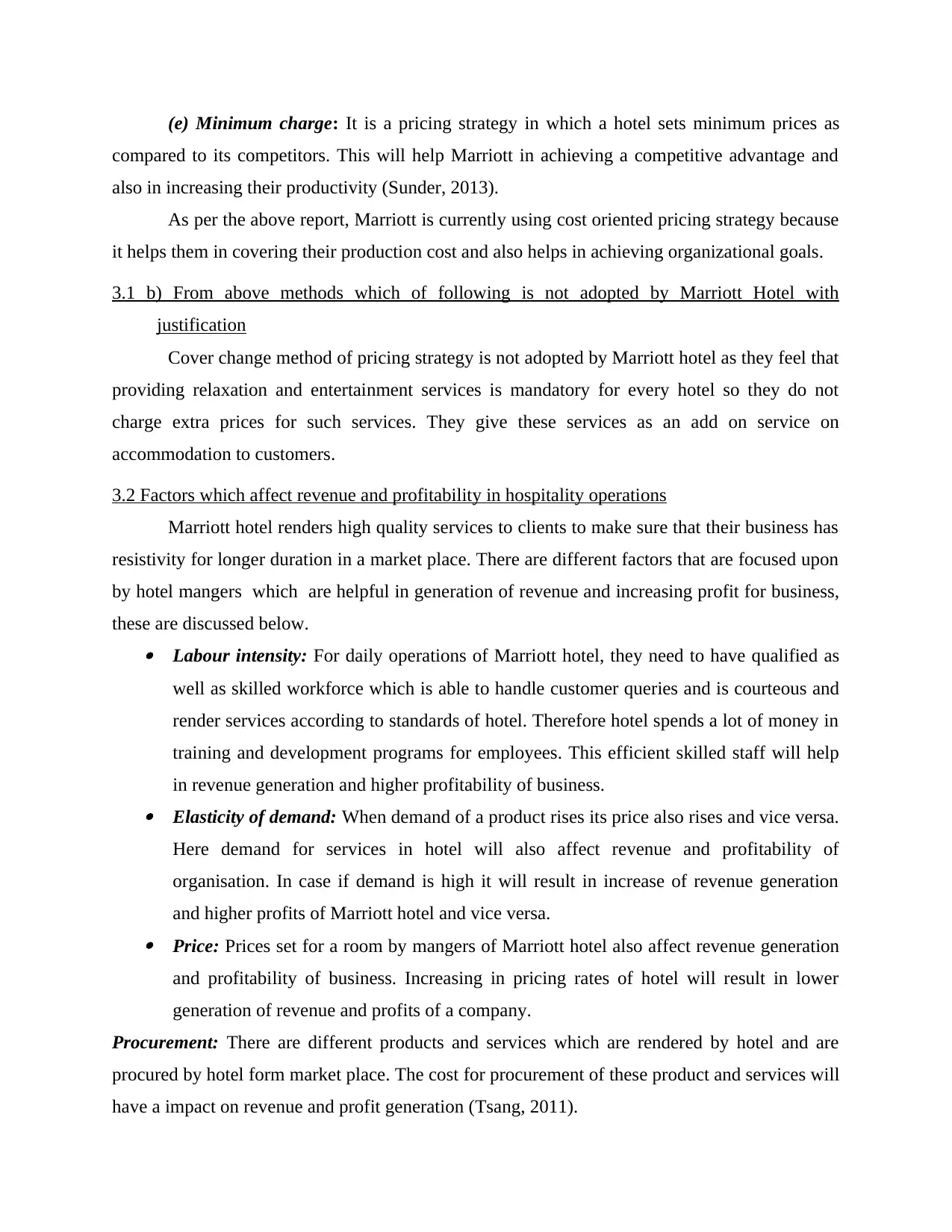
(e) Minimum charge: It is a pricing strategy in which a hotel sets minimum prices as
compared to its competitors. This will help Marriott in achieving a competitive advantage and
also in increasing their productivity (Sunder, 2013).
As per the above report, Marriott is currently using cost oriented pricing strategy because
it helps them in covering their production cost and also helps in achieving organizational goals.
3.1 b) From above methods which of following is not adopted by Marriott Hotel with
justification
Cover change method of pricing strategy is not adopted by Marriott hotel as they feel that
providing relaxation and entertainment services is mandatory for every hotel so they do not
charge extra prices for such services. They give these services as an add on service on
accommodation to customers.
3.2 Factors which affect revenue and profitability in hospitality operations
Marriott hotel renders high quality services to clients to make sure that their business has
resistivity for longer duration in a market place. There are different factors that are focused upon
by hotel mangers which are helpful in generation of revenue and increasing profit for business,
these are discussed below. Labour intensity: For daily operations of Marriott hotel, they need to have qualified as
well as skilled workforce which is able to handle customer queries and is courteous and
render services according to standards of hotel. Therefore hotel spends a lot of money in
training and development programs for employees. This efficient skilled staff will help
in revenue generation and higher profitability of business. Elasticity of demand: When demand of a product rises its price also rises and vice versa.
Here demand for services in hotel will also affect revenue and profitability of
organisation. In case if demand is high it will result in increase of revenue generation
and higher profits of Marriott hotel and vice versa. Price: Prices set for a room by mangers of Marriott hotel also affect revenue generation
and profitability of business. Increasing in pricing rates of hotel will result in lower
generation of revenue and profits of a company.
Procurement: There are different products and services which are rendered by hotel and are
procured by hotel form market place. The cost for procurement of these product and services will
have a impact on revenue and profit generation (Tsang, 2011).
compared to its competitors. This will help Marriott in achieving a competitive advantage and
also in increasing their productivity (Sunder, 2013).
As per the above report, Marriott is currently using cost oriented pricing strategy because
it helps them in covering their production cost and also helps in achieving organizational goals.
3.1 b) From above methods which of following is not adopted by Marriott Hotel with
justification
Cover change method of pricing strategy is not adopted by Marriott hotel as they feel that
providing relaxation and entertainment services is mandatory for every hotel so they do not
charge extra prices for such services. They give these services as an add on service on
accommodation to customers.
3.2 Factors which affect revenue and profitability in hospitality operations
Marriott hotel renders high quality services to clients to make sure that their business has
resistivity for longer duration in a market place. There are different factors that are focused upon
by hotel mangers which are helpful in generation of revenue and increasing profit for business,
these are discussed below. Labour intensity: For daily operations of Marriott hotel, they need to have qualified as
well as skilled workforce which is able to handle customer queries and is courteous and
render services according to standards of hotel. Therefore hotel spends a lot of money in
training and development programs for employees. This efficient skilled staff will help
in revenue generation and higher profitability of business. Elasticity of demand: When demand of a product rises its price also rises and vice versa.
Here demand for services in hotel will also affect revenue and profitability of
organisation. In case if demand is high it will result in increase of revenue generation
and higher profits of Marriott hotel and vice versa. Price: Prices set for a room by mangers of Marriott hotel also affect revenue generation
and profitability of business. Increasing in pricing rates of hotel will result in lower
generation of revenue and profits of a company.
Procurement: There are different products and services which are rendered by hotel and are
procured by hotel form market place. The cost for procurement of these product and services will
have a impact on revenue and profit generation (Tsang, 2011).
Paraphrase This Document
Need a fresh take? Get an instant paraphrase of this document with our AI Paraphraser
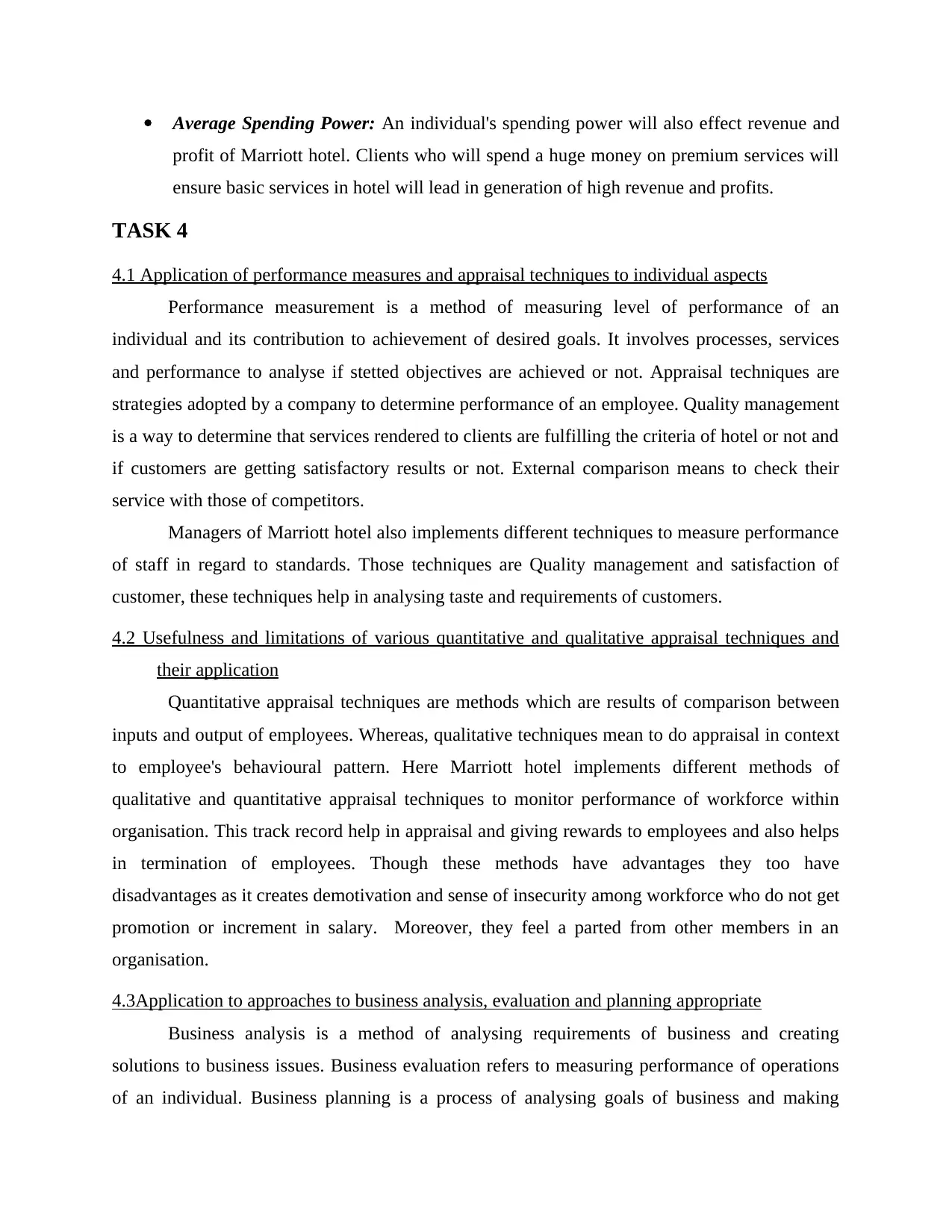
Average Spending Power: An individual's spending power will also effect revenue and
profit of Marriott hotel. Clients who will spend a huge money on premium services will
ensure basic services in hotel will lead in generation of high revenue and profits.
TASK 4
4.1 Application of performance measures and appraisal techniques to individual aspects
Performance measurement is a method of measuring level of performance of an
individual and its contribution to achievement of desired goals. It involves processes, services
and performance to analyse if stetted objectives are achieved or not. Appraisal techniques are
strategies adopted by a company to determine performance of an employee. Quality management
is a way to determine that services rendered to clients are fulfilling the criteria of hotel or not and
if customers are getting satisfactory results or not. External comparison means to check their
service with those of competitors.
Managers of Marriott hotel also implements different techniques to measure performance
of staff in regard to standards. Those techniques are Quality management and satisfaction of
customer, these techniques help in analysing taste and requirements of customers.
4.2 Usefulness and limitations of various quantitative and qualitative appraisal techniques and
their application
Quantitative appraisal techniques are methods which are results of comparison between
inputs and output of employees. Whereas, qualitative techniques mean to do appraisal in context
to employee's behavioural pattern. Here Marriott hotel implements different methods of
qualitative and quantitative appraisal techniques to monitor performance of workforce within
organisation. This track record help in appraisal and giving rewards to employees and also helps
in termination of employees. Though these methods have advantages they too have
disadvantages as it creates demotivation and sense of insecurity among workforce who do not get
promotion or increment in salary. Moreover, they feel a parted from other members in an
organisation.
4.3Application to approaches to business analysis, evaluation and planning appropriate
Business analysis is a method of analysing requirements of business and creating
solutions to business issues. Business evaluation refers to measuring performance of operations
of an individual. Business planning is a process of analysing goals of business and making
profit of Marriott hotel. Clients who will spend a huge money on premium services will
ensure basic services in hotel will lead in generation of high revenue and profits.
TASK 4
4.1 Application of performance measures and appraisal techniques to individual aspects
Performance measurement is a method of measuring level of performance of an
individual and its contribution to achievement of desired goals. It involves processes, services
and performance to analyse if stetted objectives are achieved or not. Appraisal techniques are
strategies adopted by a company to determine performance of an employee. Quality management
is a way to determine that services rendered to clients are fulfilling the criteria of hotel or not and
if customers are getting satisfactory results or not. External comparison means to check their
service with those of competitors.
Managers of Marriott hotel also implements different techniques to measure performance
of staff in regard to standards. Those techniques are Quality management and satisfaction of
customer, these techniques help in analysing taste and requirements of customers.
4.2 Usefulness and limitations of various quantitative and qualitative appraisal techniques and
their application
Quantitative appraisal techniques are methods which are results of comparison between
inputs and output of employees. Whereas, qualitative techniques mean to do appraisal in context
to employee's behavioural pattern. Here Marriott hotel implements different methods of
qualitative and quantitative appraisal techniques to monitor performance of workforce within
organisation. This track record help in appraisal and giving rewards to employees and also helps
in termination of employees. Though these methods have advantages they too have
disadvantages as it creates demotivation and sense of insecurity among workforce who do not get
promotion or increment in salary. Moreover, they feel a parted from other members in an
organisation.
4.3Application to approaches to business analysis, evaluation and planning appropriate
Business analysis is a method of analysing requirements of business and creating
solutions to business issues. Business evaluation refers to measuring performance of operations
of an individual. Business planning is a process of analysing goals of business and making
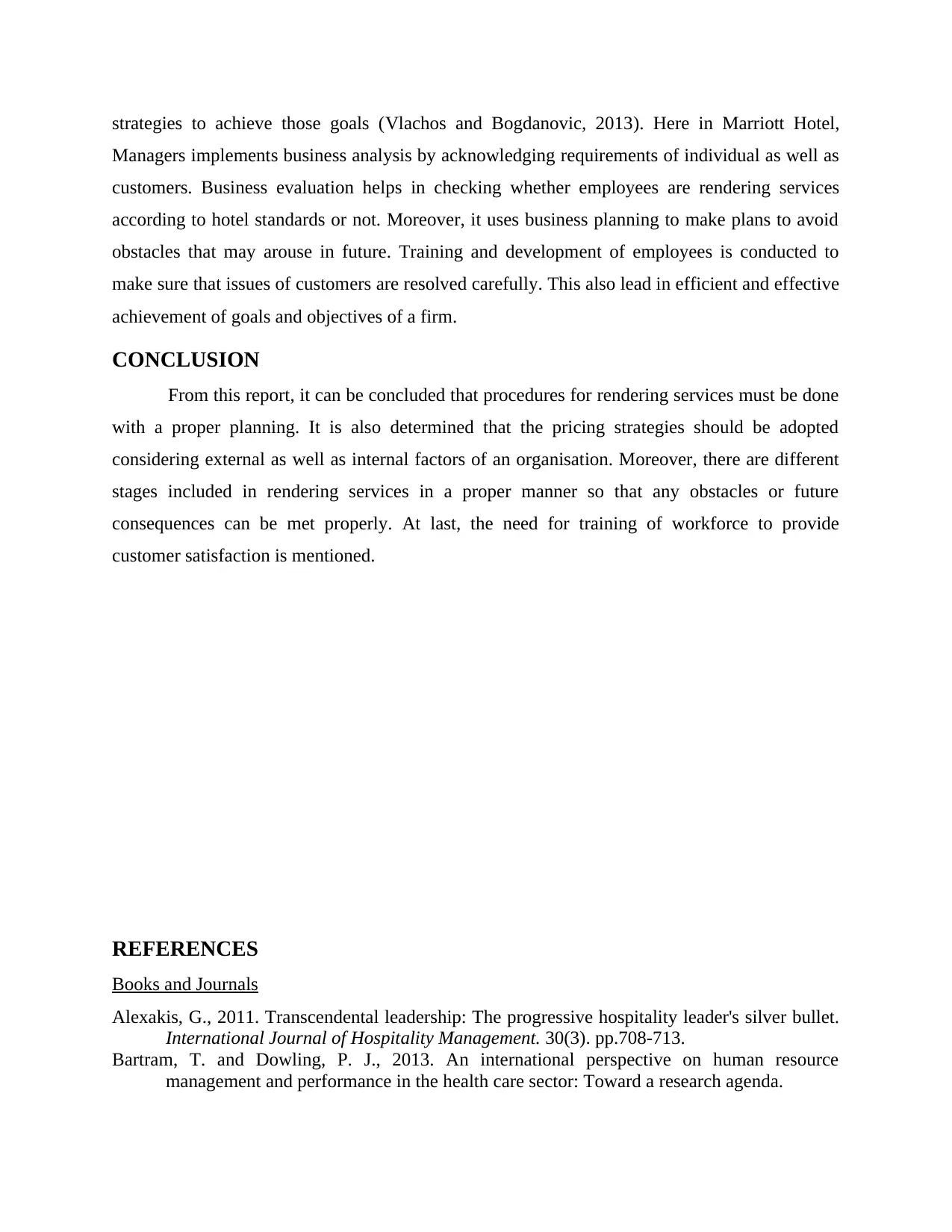
strategies to achieve those goals (Vlachos and Bogdanovic, 2013). Here in Marriott Hotel,
Managers implements business analysis by acknowledging requirements of individual as well as
customers. Business evaluation helps in checking whether employees are rendering services
according to hotel standards or not. Moreover, it uses business planning to make plans to avoid
obstacles that may arouse in future. Training and development of employees is conducted to
make sure that issues of customers are resolved carefully. This also lead in efficient and effective
achievement of goals and objectives of a firm.
CONCLUSION
From this report, it can be concluded that procedures for rendering services must be done
with a proper planning. It is also determined that the pricing strategies should be adopted
considering external as well as internal factors of an organisation. Moreover, there are different
stages included in rendering services in a proper manner so that any obstacles or future
consequences can be met properly. At last, the need for training of workforce to provide
customer satisfaction is mentioned.
REFERENCES
Books and Journals
Alexakis, G., 2011. Transcendental leadership: The progressive hospitality leader's silver bullet.
International Journal of Hospitality Management. 30(3). pp.708-713.
Bartram, T. and Dowling, P. J., 2013. An international perspective on human resource
management and performance in the health care sector: Toward a research agenda.
Managers implements business analysis by acknowledging requirements of individual as well as
customers. Business evaluation helps in checking whether employees are rendering services
according to hotel standards or not. Moreover, it uses business planning to make plans to avoid
obstacles that may arouse in future. Training and development of employees is conducted to
make sure that issues of customers are resolved carefully. This also lead in efficient and effective
achievement of goals and objectives of a firm.
CONCLUSION
From this report, it can be concluded that procedures for rendering services must be done
with a proper planning. It is also determined that the pricing strategies should be adopted
considering external as well as internal factors of an organisation. Moreover, there are different
stages included in rendering services in a proper manner so that any obstacles or future
consequences can be met properly. At last, the need for training of workforce to provide
customer satisfaction is mentioned.
REFERENCES
Books and Journals
Alexakis, G., 2011. Transcendental leadership: The progressive hospitality leader's silver bullet.
International Journal of Hospitality Management. 30(3). pp.708-713.
Bartram, T. and Dowling, P. J., 2013. An international perspective on human resource
management and performance in the health care sector: Toward a research agenda.
⊘ This is a preview!⊘
Do you want full access?
Subscribe today to unlock all pages.

Trusted by 1+ million students worldwide
1 out of 14
Related Documents
Your All-in-One AI-Powered Toolkit for Academic Success.
+13062052269
info@desklib.com
Available 24*7 on WhatsApp / Email
![[object Object]](/_next/static/media/star-bottom.7253800d.svg)
Unlock your academic potential
Copyright © 2020–2026 A2Z Services. All Rights Reserved. Developed and managed by ZUCOL.





